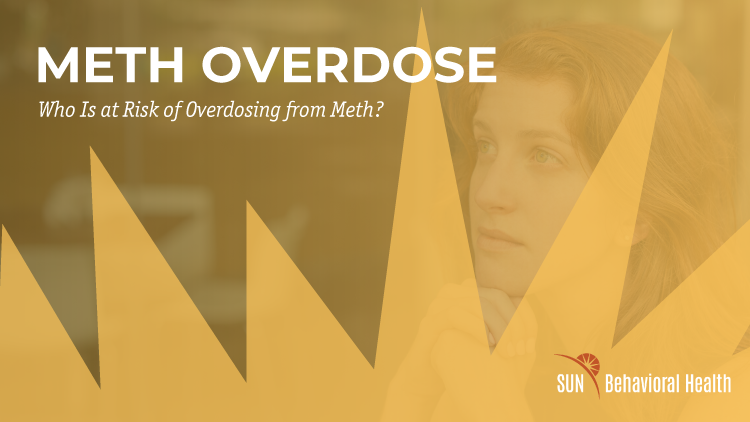Services
- Home
- Mental Health
- Who We Treat
- How We Treat
- Patients & Visitors
- About
- Lexington
close

Is your loved one regularly consuming methamphetamine? Are you worried they might experience an overdose?
Many loved ones of people with meth addiction have the same questions. In Kentucky, 1,069 people died from methamphetamine-related overdoses in 2022. However, by understanding what a meth overdose is and what signs to look for, you can help save your loved one’s life. At SUN Behavioral Health Kentucky, we solve unmet needs, and one of the ways we do so is by helping loved ones understand how they can help in the event of a meth overdose.
A meth overdose occurs when someone has consumed more meth than their body can handle at once. When this happens, it is a medical emergency, and the person requires professional care to save their life. There are several ways an overdose can happen.
When people take meth, they often experience multiple side effects. These effects usually come during one of two stages. When someone is experiencing a “high,” it gives them feelings of euphoria, alertness, and energy due to increased dopamine in the brain. However, these feelings do not last long and quickly wear off into what is known as a “crash,” which can come with feelings of depression. To gain the positive emotions of the high back, many people will take more meth and start the cycle over again, or they might take more of the substance in an attempt to make those emotions last longer.
Over time, someone with a meth use disorder may build up a tolerance to the substance, which means they will require a higher dose to get the same effects. People want to experience the high for as long as they can, which can lead to rapidly increasing doses or mixing meth with other substances such as heroin or fentanyl. Both the practice of cutting meth with other substances, which can be unpredictable, and increasing doses can lead to someone experiencing an overdose.
However, sometimes, an overdose can happen after the first time someone consumes methamphetamine. This is a risk, as the individual has no tolerance to the substance.

When someone is experiencing an overdose of any substance, medical attention is needed immediately. However, depending on the substance, the symptoms of overdose may be different. Since methamphetamine is a stimulant, someone experiencing a meth overdose will have different symptoms than someone experiencing an opioid overdose. Understanding the symptoms of a meth overdose can save lives. Symptoms to look out for if someone you love is consuming meth include:
Meth overdose is extremely dangerous. However, everyone experiences a different combination of overdose symptoms. For instance, some people may experience stroke or heart attack, which can result in serious health complications or death. Others may experience seizures. These can result in loss of consciousness or impaired motor skills.
Some individuals may experience nausea, diarrhea, or vomiting during their overdose, which can lead to dehydration. However, others can experience hallucinations and feel like bugs are crawling under their skin, leading to psychological distress.
If a meth overdose is left untreated, it can result in death. In 2022, 34,022 people died from a meth-related overdose in the United States. Understanding what symptoms to look for will allow your loved one to get the life-saving care they need.
The most important thing to remember is to remain calm and call 911 immediately. It is essential to stay on the phone with the dispatcher until help arrives so you can keep them updated on the status of your loved one. Help is coming.
While waiting for the paramedics to arrive, keep your loved one awake. If they do lose consciousness, turn them to their side, which can prevent them from choking if they end up vomiting.
When the first responders arrive, you should be honest with them and provide all the information you can. Some questions the paramedics may ask include:
The answers to these questions help the paramedics determine how to help your loved one best.
The Good Samaritan Law is a law in Kentucky that allows you to help yourself or someone else who is experiencing a medical emergency, such as an overdose. It protects you from being charged with a criminal offense if you have paraphernalia or an illicit substance in the event you are seeking care for someone who is experiencing an overdose. What this law means is that if your loved one is experiencing an overdose, you are allowed to seek medical care without risking charges related to that event.
Anyone can experience a meth overdose. It doesn’t matter if it is your first time consuming the substance or if you have been taking it for over a decade. If you consume meth, you are at risk of overdose.
Each time someone consumes meth, their risk of overdose increases. So, people who have a meth use disorder are especially at risk. Alongside that, people who started consuming meth at an early age or have been taking the substance for many years will have an increased risk. Additionally, if you grew up in an environment where family or friends were consuming methamphetamine, you have a higher chance of taking the substance, which increases your chances of overdose.
If someone consumes meth with other substances, they are more likely to overdose. This risk occurs because the combination of multiple substances is unpredictable, and even if you have done it before, each time can be different. If you have numerous substance use disorders or have existing mental health concerns, seeking treatment for all of your co-occurring disorders is essential in preventing a return to use, which can result in an overdose.
The way you consume methamphetamine can also play a role. For example, people who inject or smoke the substance may be more likely to overdose than those who consume it with a different method – however, that doesn’t mean other methods are “safe.”
When someone has already sought meth addiction treatment or they have been without meth for some time and then returned to use, they have a higher chance of experiencing an overdose. This happens because the body is no longer tolerant of the substance, and many times, when someone returns to use, they take the exact dosage they took before. Any of the above risk factors do not necessarily mean you will overdose, but they do increase your chances each time you take meth.

The best way to avoid a meth overdose is to stop taking it. This idea is often easier said than done, as meth withdrawal can come with uncomfortable symptoms that encourage you to continue. However, treatment for a meth use disorder can help. During your recovery journey, you will meet with a compassionate team who will work with and support you as you embark on the expedition toward healthier habits. Along the way, you will learn skills and form connections that will follow you for years. You don’t have to try to recover from a meth use disorder alone.
At SUN Behavioral Health Kentucky, we solve unmet needs in Erlanger, KY. We provide an adult evening intensive outpatient program (IOP) 3 days a week from 5:30 PM until 8:30 PM. It works best for those unable to commit to treatment during the day. If you wish to learn more about our meth use disorder treatment, feel free to call us today at 859-429-5188.